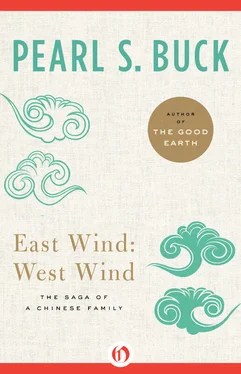But as I passed outward through the small gates, I met my brother. He was going to the great gatehouse, outwardly to ask some question of the gate-man, but I knew at once that he meant to wait there for me. When I drew near to him I scanned his face and saw that the vigor and determination which had made him foreign-looking in my eyes had given way to bewilderment and anxiety, which with his Chinese robes and his drooping head, made him look again like the schoolboy, half-sullen, that he had been before he went away.
“How is she, your wife?” I asked before he spoke.
His lips trembled; he passed his tongue over them.
“Not well. O my sister! We cannot long endure this life. I shall have to do something — go away and find work—”
He stopped, and I urged him then to have patience before he decided to break away. It was much that our mother allowed the foreigner to come into the court, and a year was not long. But he shook his head.
“My wife herself has begun to despair,” he said heavily. “Until we came here she did not lose heart. But now she droops from day to day. Our food is distasteful to her — and I cannot procure foreign food for her. She eats nothing. In her own land she has been accustomed to freedom and homage. She is accounted beautiful, and many men have loved her. I was proud to win her from them all. I thought it proved the superiority of our race.
“But now she is like a flower plucked and placed in a silver vase, but without water. Day after day she sits silent, and her eyes burn in her white and whiter face.”
I marveled to hear my brother hold it a virtue in a woman to have been loved by many men. Here it would be considered praise for none but a harlot. How could she indeed ever hope to become one of us! But as he spoke a new thought had come into my mind.
“Does she desire to return to her own people?” I asked eagerly.
Here I saw a solution. If she would go away and the seas stretch again between them, my brother who is, after all, but a man, would cease to think of her, and he would return to his duty. But I shall not soon forget his look when I said this. His eyes seemed to fly at me with anger.
“If she goes, I will go with her,” he said with sudden violence. “If she dies in this my home I am no more the son of my parents, forever!”
I chided him gently for such unfilial words, when, to my great astonishment, he burst into a harsh sob and turning, he walked quickly away.
I stood there, scarcely knowing what to do, watching his bowed figure recede into the other court where he lived, and then irresolutely, and indeed, half fearing my mother, I followed him.
I went in then to see the foreigner. She was walking restlessly about the inner court of my brother’s apartment. She wore her foreign garb again, a straight robe of a dark blue color, cut away to leave bare her white throat. In her hand was a foreign book, open, and covered with short lines of letters running across the middle of each page in little groups.
She walked about reading and frowning as she read, but when she saw me, her face changed with her smile, and she stood still until I was at her side. We spoke a few words then, casual words. She could converse quite well now if one spoke of simple matters. I refused to go in, saying I must return to the child, and she was sorry. I mentioned the ancient juniper in the court; she spoke of a toy she was making for my son from cloth stuffed with cotton. I thanked her — and there was no talk left. I waited, then I began my farewell, aching with vague pain, because the seas are between us, and I could do nothing to help my brother or my mother.
But when I turned to leave she suddenly seized my hand and held it fast. I looked at her then, and I saw her shake tears from her eyes with a quick fling of her head. Pity filled me, and I murmured to her, not knowing what to say except to promise to come again soon. Her lips trembled while she tried to smile.
Thus passed yet another moon. Then my father returned home. Strangely enough, he took a great interest in my brother’s wife and found a liking for her. Wang Da Ma said that as soon as he entered the great gate he inquired whether or not my brother had brought the foreigner home, and when he heard it, he changed his robes and sent word that he would visit my brother’s apartments as soon as he had eaten.
He entered, suave and smiling, and accepted the obeisances of my brother and demanded to see the foreigner. When she came in he laughed a great deal and examined her appearance and commented freely upon her looks.
“She is handsome enough in her way,” he announced in great good nature. “Well, well, it is a new thing in the family. And can she speak our language?”
My brother was displeased with his freedom and replied briefly that she was learning. My father laughed immoderately and cried,
“Never mind — never mind — I suppose love-words sound as sweetly in a foreign tongue — heh-heh-heh!” And he laughed until his fat body shook.
As for her, she could not understand all his words, spoken carelessly, as he always speaks, in his rich, thick voice, but his friendliness cheered her; and my brother could not well tell her that his father was lacking in respect to her.
I am told that my father visits her often now and toys with her, gazing at her freely and teaching her new words and expressions. He has sent her sweetmeats and once a Buddha’s hand lemon tree in a green glazed pot. My brother, however, takes care to be present at all these meetings.
She is like a child. She understands nothing at all.
I went to see my brother’s wife again yesterday, after I had given my mother greeting for the feast day. I do not dare to risk my mother’s displeasure by more than passing visits to the foreigner, lest I be forbidden altogether to go into my brother’s courts.
“You are happier?” I asked her.
She smiled her quick smile. It always lightens her grave face like sudden sun from behind a somber cloud.
“Yes, perhaps!” she answered. “At least things are no worse with us. I have not seen his mother except once when she wanted me to make tea. I had never made tea in my life like that before! But his father comes to see us nearly every day.”
“We will have patience,” I replied. “The day will yet come when the August Mother will relent.”
Instantly her face hardened.
“It is not as though I had done anything,” she said in a low compressed voice. “Surely it is not a fault to love and to marry? His father is the only friend I have in this house. He is kind to me, and I need kindness I can tell you! I do not think I can stand it much longer, locked up like this!”
She shook back her short yellow hair, and then suddenly her eyes grew dark and angry. I saw she was looking out into the other courts, and my eyes followed hers.
“Look at that, again!” she cried. “There they are — I am like a play for those women! I am weary to death of their staring. Why are they always there whispering and peeping and pointing?”
She nodded as she spoke at the moon-gate. There, gathered about its entrance, were the concubines and half a dozen slaves. They were idly eating peanuts and feeding them to their children, but secretly they were peering at the foreigner and I could hear them laughing. I frowned at them but they pretended not to see me, and at last she drew me further into the room with her and slid fast the heavy wooden doors against them.
“I cannot bear them,” she said passionately. “I cannot understand what they say, but I know they talk about me from morning until night.”
I soothed her,
“You must not mind them. They are altogether ignorant.”
But she shook her head, saying,
“I cannot keep bearing it day after day.”
Читать дальше











